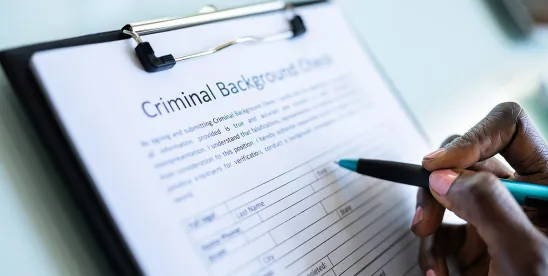On November 16, New York’s Clean Slate Act took effect. The purpose of the Act is to aid in curbing discrimination in the workplace against individuals with certain New York State criminal convictions. As discussed below, the Act will limit the types of criminal convictions that employers can access and dictates how they must handle the information that they are made aware of when considering it in connection with employment actions, such as hiring or continued employment.
Read the Act here.
Certain New York State Criminal Convictions Automatically Sealed
The Act mandates that the New York State Unified Court System seal all eligible convictions in the next three years (i.e., November 16, 2027). Subsequently, all sealed convictions will be unavailable to most employers that conduct background checks. As an additional safeguard, the New York State Human Rights Law has been amended to make it unlawful for employers to inquire about or make employment decisions based on sealed convictions, with the exception of limited instances.
Importantly, the Act only seals New York State penal convictions. The Act does not seal criminal convictions under federal law or out-of-state convictions.
Convictions Eligible for Automatic Sealing
- Most misdemeanors are eligible for automatic sealing three years from the date of sentencing or three years from the date that the individual is released from incarceration, whichever is later.
- Other than exempted felonies, felonies are eligible for automatic sealing eight years from the date of sentencing or eight years from the date that the individual is released from incarceration, whichever is later.
- Eligible convictions will not be sealed where the individual has a pending criminal case or is presently on probation, parole, or post-release supervision.
- Certain convictions, such as non-drug-related Class A Felonies (e.g. murder, first-degree kidnapping, first-degree arson, aggravated enterprise corruption), sex offenses, and sexually violent offenses are not eligible for sealing under the Act.
Certain Employers Are Exempt
Employers required by state or federal law to conduct fingerprint-based criminal background checks will continue to have access to convictions otherwise sealed by the Act. Examples of exempt employers include those who provide childcare, eldercare, or care to individuals with disabilities.
However, exempt employers have a legal obligation to safeguard information regarding otherwise sealed convictions and may be liable for negligence under the New York Civil Rights Law if they fail to adequately protect that information.
Increased Notice Obligations
The Act mandates that any employer receiving criminal history information is required to provide a copy of such information to the applicant or employee and notify them of their right to seek correction of any incorrect information it contains. This obligation applies even if the employer decides not to take any adverse action based on the information.
Takeaways
- Employers currently conducting criminal background checks must exercise due diligence to ensure that their practices comply with the Act. Employers should consult with counsel when deciding to take employment action based upon New York State criminal convictions.
- This new law regarding the use of an individual’s criminal history is in addition to the US Fair Credit Reporting Act, the NYS Correction Law Article 23-A, and the NYC Fair Chance Act. Compliance with each of these laws is still required, as well as consideration of the factors set out by the US Equal Employment Opportunity Commission on the subject of the use of criminal records.





 />i
/>i

